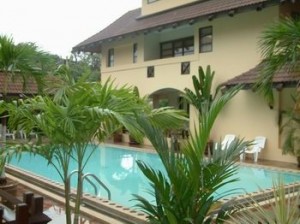Dormant Companies
- Posted in Readingroom
- Write comment
Setting Up a “Dormant Company” to Buy Land
A word “Dormant Company” is widely used in Thailand, especially in Pattaya, for a sleeping company having no business activity, but is created just only to own a property. If you are retired expat wishing to buy a real property in Thailand, you will be instantly advised by a seller to set up a Thai company to register the ownership of land. It is very easy to set up a company for such a purpose, but it can be a burdensome over a long period of time. You should somehow come to understand the Thai company and tax laws. A basic knowledge of accounting and corporate structure is a must to ensure that your hibernation life will be easy, just like every Sunday morning.
What is a “Dormant Company” It can be instantly understood that this sleeping company is set up with a majority Thai shareholders of 51% and expat shareholding of 49% to own a real property. You will be advised to retain a consulting office to prepare the balance sheet at the end of every financial year. There will be no tax to pay, and you will only be required to prepare a blank form for the tax return, as there is no business activity on the balance sheet. Some consultants even ask you to pay in advance for fees in the preparation of the accounts and balance sheets, sometimes even for 6 years ahead. You will be told to sleep well, in regard to your sleeping company with the optimistic words “No problem Sir, everybody in Pattaya does it like this.”
There is no definition of “Dormant Company” under Thai laws. It is always confusingly comparable to a holding company, which is set up to hold shares in other subsidiary companies in a group. The “Dormant Company” is not exempted from tax compliance under the Revenue Code of Thailand. It means that the “Dormant Company” will have to prepare the financial statements or balance sheet within 150 days from the last date of the accounting period, which is normally December 31 of every year. The financial statements or “Balance Sheet” must be audited by a Certified Public Accountant (CPA) signing and having opinions in the auditing report attached to the financial statements. The auditing opinions of the CPA will be on 4 levels. These range from clean opinions for the financial statements without any irregularity, to opinions with remarks in case the CPA has found any irregularities in the accounting records, and refuse to accept such financial statements. You should always have a proper English version of the auditor”s report.
The opinions of the CPA will obviously affect the ideas of persons who use or inspect these financial statements. If the company owns many plots of land, all title deeds of land should be recorded in the financial statements, with the price supported by payment documents.
It can be problematic for a company buying a land with the actual price of FIVE MILLION, but shows the selling price to the land office as only ONE MILLION. Thus, the company will have the documents to prove a value of only ONE MILLION. Just only ONE MILLION can be recorded in the financial statements, but the question can arise, – “Where have all FOUR MILLIONS gone”
The company should have its own bank account and make the payment for the price of land by a bank draft or cashier”s cheque under the name of the company. Within 150 days from the last of accounting period, the audited financial statements must be filed with the Ministry of Commerce. In addition, the Annual Corporate Tax Returns (Phor. Ngor. Dor. 50) and Interim (Mid-Year) Corporate Income Tax Returns (Phor.Ngor.Dor. 51) must be prepared and filed with the Revenue Office, together with the audited financial statements. All corporate documents and financial statements should be translated into English, with notarization from qualified lawyers and / or accountants. The original duplicate of financial statements should be also in English, with the real signature of the CPA who audited the company.
The company cannot be dormant forever, and the Revenue Office has a current policy to inspect all dormant companies, who never pay tax for a certain period. In reality, even though the company only owns the land and house as a residence of its expat director, the Company should have income from the director as rental fees, because the company is a legal entity or juristic person separated from the shareholders or directors. How can the director live in the house owned by the company gratuitously and absolutely free” The rental fees will be taxable incomes subject the “Corporate Income Tax” of 15% of the net profits for the SME (Small & Medium Enterprise). A SME is a limited company with a registered capital not more than 5 millions baht. It is advisable to set up a limited company with a registered capital of only one million baht even you want to buy a land and house with value of 10 million baht. Therefore, you may enjoy the status of SME. The excessive amount of 9 million can be a loan you as a director give to the company. The net profit comes from “Gross Incomes” deducted by “Allowable Expenses” which can be actual expenses and depreciation of a building house of 5% for a period of 20 years. We believe that the dormant company should have tax liabilities of at least 4,000-5,000 baht per year from the rental fees received accordingly.
For instance, if a company holds a big villa with a land area of 10 rais, the tax liabilities will be obviously increased by more than 4,000 baht because the actual rental fees can be assessed by the Revenue Officers according to their real market value. In the latter case, you have to record all allowable expenses and depreciation of the assets, which will require a sophisticated accounting system.
Other taxes can be “Withholding Tax” that a company is required to deduct the amount of tax for some payments, i.e., 3% for services, 5% for rent and 2% for advertising. After deduction, the company has to remit the deducted money to the Revenue Office within 7 days from the month of payment. If the company fails to deduct the withholding tax, the company will have to pay with surcharge and penalty fine.
If the company has not a bank account to keep the money from capitalization, it will be deemed that the cash money is kept in hands of the director. In this case, the director becomes a debtor of the company and must pay interest to the company. The interest will be a taxable income of the company.
Many people make a typical mistake about the business objectives of the company. You may set up a limited company to do import and export business and buy a land and house to be the office of the Company. In this case, you do not have to register neither Value Added Tax (VAT) nor Specific Business Tax (SBT). However, some people mistakenly register the business objectives of purchasing, owning and selling which is the real estate business under the Revenue Code of Thailand. The real estate business is subject to a Specific Business Tax (SBT) of 3.3% of the gross income.
If the Company fails to file the financial statements with the Ministry of Commerce, it can be prosecuted with a fine of not more than 50,000 baht for both director and company; – the total fine is then 100,000 baht. For Companies failing to file the financial statements for 3 years consecutively, these companies can be deemed “Defunct”. Under Section 1246 – of the “Civil and Commercial Code of Thailand.” company who is not carrying on business or is not in operation can be deemed a “Defunct Company,” whereby the Registrar may with reasonable cause, accordingly inspect the company.
With the proper procedures of inspection, the “Defunct Company” may be legally forced to dissolve and the Registrar will strike the name of the company off the register. This will be complicated if the defunct company that is dissolved holds a real property, and the liquidation process to share the proceeds will be costly and time consuming.
The persons who can clearly explain all of the above tax and legal aspects to you should the qualified Thai Certified Public Accountant and Lawyer. These qualified professionals will be happy and willing to show you their professional licenses, issued by the
Professional Institutes by which they are regulated. Most accountants are not qualified CPA”s, and some even try to show that they are qualified. There are about 6,000 qualified CPAs in Thailand, and most of them always display their professional licenses in their office. In case of mal-practice, you should know how to deal with them for professional etiquette, (i.e. Association of Certified Public Accountants or Law Society of Thailand).
Even these professionals cannot communicate with you in the beautiful accent of your English language, like your compatriot consultants or friends do, but you will not miss any professional ideas and technicalities, which will obviously assist to be aware and help you overcome your dilemma. If you are prudent and protective, you will always be happy with your hibernation in this “Promised Land” of Pattaya.

